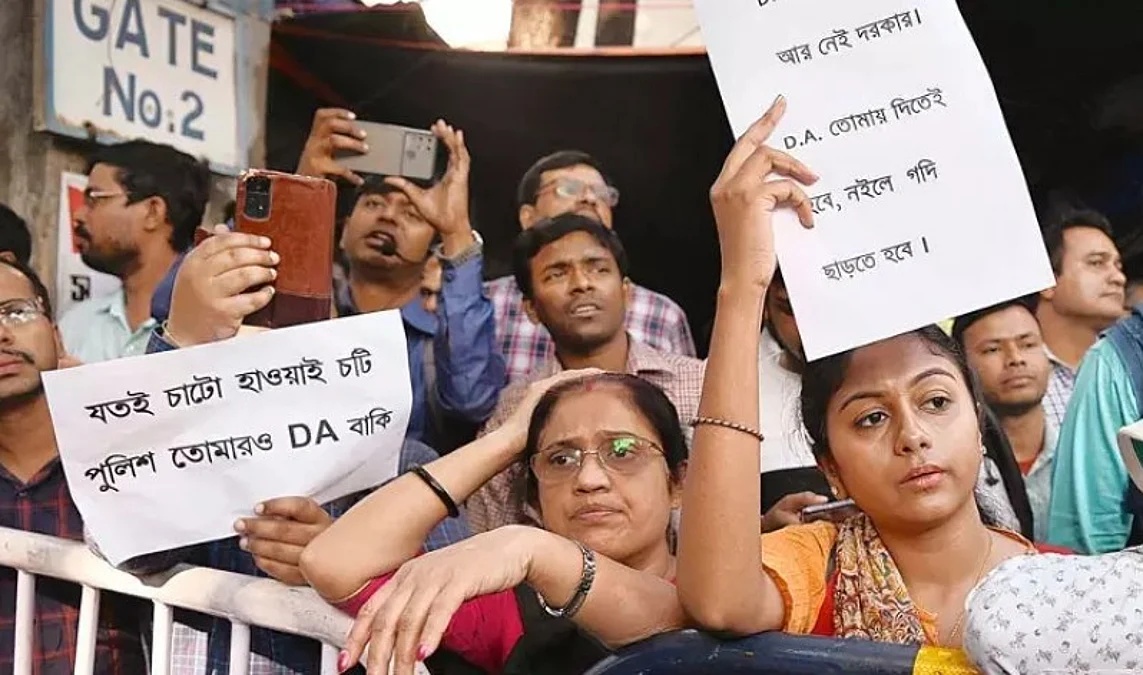
Protest Rally Amid Legal Deadlines and Financial Delays
The United Forum of State Government Employees (UFSGE), representing West Bengal’s public sector workforce, has announced a protest rally on July 21 to demand the immediate payment of pending dearness allowance arrears. This demonstration will coincide with the Trinamool Congress’s annual Martyrs’ Day rally in Kolkata, drawing attention to the unresolved dispute over salary disparities between state and central government employees. The state government’s failure to meet a Supreme Court-mandated deadline for disbursing 25% arrears has intensified the crisis, with employees facing financial strain as the financial year approaches. The UFSGE’s decision to stage the rally at Shahid Minar, a symbolic location in Kolkata, underscores the gravity of the issue, as workers from various departments prepare to voice their grievances publicly.
Legal Battle and Financial Implications
The dispute centers on the state government’s request for a six-month extension to clear the arrears, which the Supreme Court initially ordered in April. Despite the deadline passing, the administration submitted a petition to the apex court, citing fiscal constraints as the reason for the delay. However, employees argue that this delay undermines their livelihoods, with the state Finance department warning that the Rs 12,000 crore required to settle the dues could disrupt welfare schemes. The UFSGE has vowed to escalate the matter through legal channels, including filing a contempt-of-court petition, while emphasizing that the 18% dearness allowance currently offered to state workers is significantly lower than the 55% provided to central government employees.
Planned Marches and Cross-Departmental Solidarity
Following the July 21 rally, the UFSGE plans a ‘march to State Secretariat’ on July 28, uniting public sector employees and teachers who lost jobs due to a Supreme Court order in April. This cross-departmental solidarity highlights the broader impact of the dispute, as workers from diverse sectors join the cause. The rally’s proximity to the Trinamool Congress event is strategic, aiming to amplify pressure on the state government to resolve the issue. Meanwhile, the UFSGE’s leadership, including convener Bhaskar Ghosh, has reiterated their commitment to legal action, signaling that the protest is part of a larger campaign to secure fair compensation for state workers.
Broader Context of Salary Disparities
The dispute reflects a nationwide trend of salary disparities between state and central government employees, with West Bengal’s workers facing particularly acute challenges. The state’s current dearness allowance rate of 18% contrasts sharply with the 55% offered to union employees, exacerbating financial distress. The UFSGE’s demand for parity has gained momentum as workers navigate the complexities of a delayed resolution. While the state administration has sought judicial intervention to extend payment deadlines, employees argue that this approach only prolongs their suffering. The UFSGE’s coordinated protests and legal strategies aim to force the government to address the issue promptly, ensuring that public sector workers are not left in financial limbo.
Future Legal and Political Implications
As the UFSGE prepares for another round of legal battles, the dispute has become a focal point for labor rights advocacy in West Bengal. The state government’s request for additional time has drawn criticism, with critics arguing that the financial burden on the exchequer is manageable. The UFSGE’s contempt-of-court petition could further escalate tensions, potentially leading to a judicial review of the Supreme Court’s original order. This legal maneuvering underscores the deepening divide between the administration and its workforce, with the protest serving as a catalyst for broader reforms in public sector compensation. The outcome of this dispute will likely shape future labor policies in the state, setting a precedent for addressing salary disparities in other regions.




